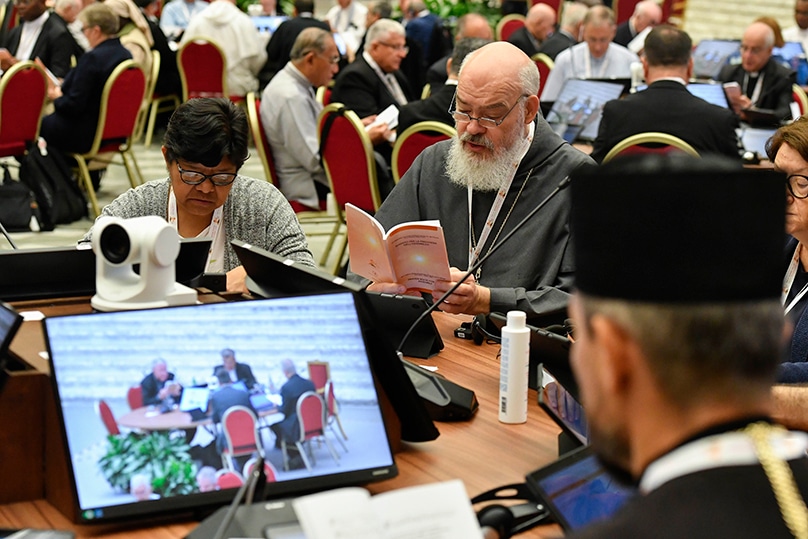
The Synod on Synodality meeting this month is the first of a two-part synodal assembly; the second session is scheduled to meet a year from now, in October 2024. No one is sure what will happen between now and then in terms of agenda-setting and process, but some important questions have been raised, and some serious concerns surfaced, during the first half of this synodal double-header.
What is this? The Synod’s Instrumentum Laboris [Working Document] referred to “the Synod … in which the XVI Ordinary General Assembly of the Synod of Bishops will take place.”
Is this a synodal sandwich, in which what was once known as the Synod of Bishops happens within “the Synod?” What kind of authority does a synodal sandwich have? What, exactly, is “the Synod,” and the role and authority of bishops within it?
Recovery of what? Invention of what? Since its inception in 2021, it has been said, not least by the pope, that this “synodal process” is recovering an ancient Christian practice that was never lost in the Christian East, but which had lain fallow in the Christian West for centuries.
It is worth noting, however, that not a single churchman from the Christian East, Catholic or Orthodox, recognizes in Synod-2023 what is meant in their churches by a “synod.” Nothing has been recovered in this process; but something is being invented. What is it?
Theology, please. The conversations “in the Spirit” during the closely-controlled small-group discussions at Synod-2023 have too often been dominated by sociological clichés, not serious theology.
This is particularly true of the discussion of Holy Orders and who the Church can ordain, in which theological considerations—Christ’s spousal relationship to the church, for example—were rarely encountered.
Yet it was precisely secularized cliché-mongering that led to the implosion in the 1980s of the once-promising Anglican-Roman Catholic dialogue, as the Archbishop of Canterbury explained to John Paul II that the Church of England’s decision to ordain women to its priesthood was heavily influenced by social change (eg, if Margaret Thatcher can be prime minister of the UK, why shouldn’t the Church of England ordain women?).
Similarly lame thinking, devoid of serious theology, has been evident in the small groups’ discussions of evangelisation, often framed by secular notions of inclusivity that have little to do with conversion to Christ.
And where, over the past two millennia, has the Catholic Church described and categorized people by their sexual desires (ie, as “LGBTQ+ Catholics”)? Isn’t there a serious theological problem here?
Broadening the bandwidth. It seems likely that the dramatis personae at Synod-2024 will be the same cast of characters gathered in Rome this month.
However, this would raise serious questions about an assembly that claims to be representative of the universal church.
Over the past three weeks, it has become obvious that Synod-2023 (not unlike the German “Synodal Way”) is largely an assembly of church professionals, and a narrow band of church professionals at that.
There seems not to be a single parish priest at Synod-2023. Religious sisters from growing institutes of consecrated life are notably absent, while religious sisters from dying communities are present and prominent.
Leaders from lay-led evangelisation ministries like FOCUS [the Fellowship of Catholic University Students] are absent, while other lay Catholics are here because they tick certain boxes in the game of identity politics.
What’s Wrong with Real Debate? The “Conversation in the Spirit” methodology of Synod-2023’s small groups not only discourages engaging differences; it virtually bans discussing them, because the participants are supposed to be “listening,” not debating.
Which of course means dodging issues. The method also suggests that all opinions are equal (because they must be assumed to be Spirit-inspired), which is both nonsense and an insult to the Holy Spirit. The same lack of true tolerance—the engagement of differences within a bond of charity and civility—has marred the Synod’s general congregations, where those allowed to speak are carefully chosen by the Synod managers and then confined to very brief statements, with no follow-up questioning.
Neo-Colonialism Lives. The synod’s focus on certain “hot-button” issues—the ordination of women, the alphabet anthropology of the LGBTQ+ activists present—seems to many African and Asian bishops another exercise in the neo-colonialism against which the pope has warned.
This must be addressed before Synod-2024, and the living parts of the world church, especially those in Africa, afforded more respect for their experience and their concerns than they have received this month.
